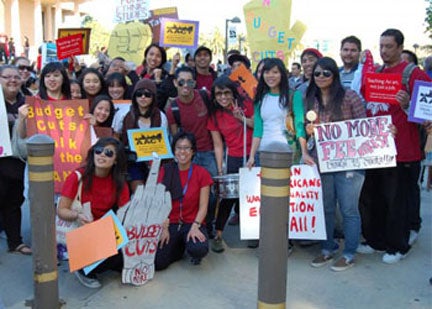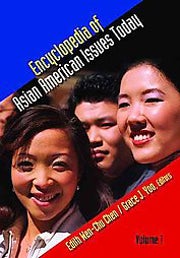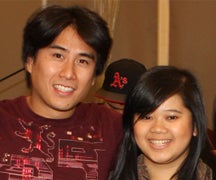Asian American Studies Newsletter
Welcome
Welcome to the Asian American Studies Department's second edition of our Alumni Newsletter. Founded in 1990, AAS is a vibrant multidisciplinary department that offers a major and minor in Asian American Studies. Many AAS graduates work in a number of diverse fields, including education, entertainment, journalism, social work, community service, business and law. This newsletter is our way of keeping in touch with our alumni community. We will be sharing faculty and student achievements and activities, and we encourage alumni to send information they would like to share to the newsletter editor ( ). We would love to hear from you.
AAS Speaker and Awards Event Featuring New Documentary "Vincent Who?"
 Celebrating its 20th anniversary, the Asian American Studies Department will hold its Distinguished Speaker and AAS/EOP Student Awards Event on Wednesday, April 14, 5:30-7:30 p.m., in the Northridge Center. This year, we will be featuring an award-winning documentary, "Vincent Who?" In 1982 Vincent Chin was beaten to death by two men who worked for a Detroit automobile plant and who received lenient sentences for this crime. The outrage incited by the plea-bargained sentences the men received for Chin’s murder became a rallying cry for those in the Asian American and Pacific Islander community—documented in the Oscar-nominated 1987 documentary, “Who Killed Vincent Chin?” Over twenty five years later, “Vincent Who?” explores the legacy of this case and asks, “Who remembers Vincent Chin?” Preeti Kulkarni, one of the executive producers of the film and a board member of Asian Pacific Americans for Progress, will lead a Q&A session about the film. This event is free and open to the public. The 20th anniversary of CSUN’s Asian American Studies Department is an ideal time to discuss the importance of this seminal case for the Asian American and Pacific Islander community and the civil rights and pan-ethnic movements. As the producers state, “This documentary looks back at the movement that started from the case and asks how far we have come and how far we still need to go.”
Celebrating its 20th anniversary, the Asian American Studies Department will hold its Distinguished Speaker and AAS/EOP Student Awards Event on Wednesday, April 14, 5:30-7:30 p.m., in the Northridge Center. This year, we will be featuring an award-winning documentary, "Vincent Who?" In 1982 Vincent Chin was beaten to death by two men who worked for a Detroit automobile plant and who received lenient sentences for this crime. The outrage incited by the plea-bargained sentences the men received for Chin’s murder became a rallying cry for those in the Asian American and Pacific Islander community—documented in the Oscar-nominated 1987 documentary, “Who Killed Vincent Chin?” Over twenty five years later, “Vincent Who?” explores the legacy of this case and asks, “Who remembers Vincent Chin?” Preeti Kulkarni, one of the executive producers of the film and a board member of Asian Pacific Americans for Progress, will lead a Q&A session about the film. This event is free and open to the public. The 20th anniversary of CSUN’s Asian American Studies Department is an ideal time to discuss the importance of this seminal case for the Asian American and Pacific Islander community and the civil rights and pan-ethnic movements. As the producers state, “This documentary looks back at the movement that started from the case and asks how far we have come and how far we still need to go.”
Asian Americans for Community and Talent (AACT)
 In Fall of 2009, a small group of proactive Asian American Studies students came together to form the organization known as Asian Americans for Community and Talent (AACT). Steve Cho, president and founder of AACT, wanted to form a community of people knowledgeable of the Asian American experience, where they would be free to share their plight and their stories in an open dialogue.
In Fall of 2009, a small group of proactive Asian American Studies students came together to form the organization known as Asian Americans for Community and Talent (AACT). Steve Cho, president and founder of AACT, wanted to form a community of people knowledgeable of the Asian American experience, where they would be free to share their plight and their stories in an open dialogue.
In the March 4th Day of Action protest, AACT gathered a group of Asian American students to march against California’s budget cuts against the state school system. They also marched to fight for the survival and growth of ethnic studies programs. AACT was published in the Daily Sundial on March 6th and March 8th as being one of the few organized CSUN student groups involved in the march.
“The whole purpose of Asian American Studies is to be racially aware,” said Cho. “The point is to share these issues.”
The Asian American Studies department is crucial to the success and well-being of AACT. The department’s professors function as critical advisors and its majors make up a bulk of the membership. The group envisions a unified Asian American student community, functioning as a politically active API group, educating students on issues relevant to ethnic studies and the importance of ethnic studies itself. Likewise, it also aims to expose the many talents of Asian American students within its community.
AACT hosted its first event in December at the Asian American Studies Activity Center. The event showcased the talents of young Asian American Studies students, ranging from Kevin Go’s stand-up comedy intermissions, music from Johnny Fab & the Sparkletts, and spoken word from Hansook Oh, Steve Cho, and Wanda Pathomrit, who performed her bilingual piece, reciting poetry about the strength in her mother's struggles. The show was also a holiday event as attendees participated in a gift exchange. Ultimately, the night was filled with excitement, laughter and even some sorrow for the experiences faced by the poets.
Among other events, AACT also initiated a 2010 Census awareness campaign, which was developed by member and Asian American Studies major, Wanda Pathomrit. The campaign highlighted the benefits of completing the census form, such as providing a more accurate count of both documented and undocumented individuals, potentially providing more federal funding to our ethnic communities, as well as increasing political representation.
AACT organized volunteers to advertise the 2010 Census on CSUN’s Matador Walk. In the first two days of the campaign, over 80 people signed AACT’s mailing list, expressing their interest in the student organization’s work.
If you would like more information regarding AACT, please email AACT at: ( ).
Interview with Dr. Edith Chen of the CSUN Asian American Studies Department
Many professors spend their sabbatical leaves working on their projects in small home offices or large musty libraries, but Dr. Edith Chen worked on editing an encyclopedia while she was also teaching at Shanghai Normal University. In the following interview, Professor Chen discusses her new publication.
 Dr. Chen, please tell us about your sabbatical book project.
Dr. Chen, please tell us about your sabbatical book project.
During my sabbatical, I was busy working on the manuscript Encyclopedia of Asian American Issues Today (with Grace J. Yoo), as an editor and contributor. This 2-volume set (1005 pages) offers a comprehensive overview of the current issues in the Asian American community, covering topics from health and education to law and media. I am proud and relieve to say, that the Encyclopedia has been recently published (Greenwood Press, January 2010)!
Why do feel that it is so important that your encyclopedia is being published at this time?
The last time a comparable encyclopedia project, The Asian American Encyclopedia. (Franklin Ng, ed.) has been published was 15 years ago. Asian Americans are one of the fastest growing racial and ethnic groups in the last couple of years (U.S. Census Bureau, 2007). Yet social problems facing Asian Americans generally remain invisible to the American public.
Why do you think that's the case?
When people think of social problems facing minorities, they think African Americans and Latinos. Asian Americans are still regarded as the model minority, who are successful and problem free. Race relations still tend to be framed in terms of black and white relations. A key example would be the 2005 media coverage of Hurricane Katrina. The focus was on the African American community. What most people don't realize is that there's also a sizable Vietnamese American community in New Orleans that was devastated by the Katrina as well. All together there were about 53,000 Asian Americans that were affected by the six parishes and counties most severely hit by the hurricane.
What are some of the other public misperceptions of Asian Americans?
Most people view Asian Americans as one unified group. Yet there are important differences between and within groups. Part of the problem is that the few times Asian Americans are included in research and public policy discussions, everyone is grouped under the umbrella term "Asian American." If you start paying attention to the data that exists out there, you will see that there is rarely ethnic specific data that draw comparisons between the different groups. For example, as a whole Asian Americans have a poverty rate of 10% which looks pretty good compared to the U.S. average was around 13%. Yet if you start looking more closely at the different groups, there's a wide range with some groups such as Cambodian, Hmong, Bangladeshi Americans having between a 20-25% of the poverty rate which far exceeds the general U.S. population. Furthermore, Asian American seniors tend to be more vulnerable to poverty than the U.S. average. So it's important that issues impacting Asian Americans as a whole are considered, as well as various subgroups. You’ll see this in the encyclopedia, which discusses issues facing some of the more established groups such as Chinese, Japanese and Korean Americans as well as relatively newer groups such as Vietnamese, Cambodian and Laotian Americans.
What did you enjoy most about working on the project?
The best part of the project was the collaborating with leading researchers, practitioners, and emerging scholars. People generously gave thousands of hours in research, writing, and fact checking to this project. All together 100 authors made this project possible, generously giving their expertise and time. They include long-time experts in the field, practitioners, and emerging scholars. CSUN Asian American Studies faculty who contributed to this project are Allan Aquino, Tracy Buenavista, Kimiko Kelly, Hyeyoung Kwon and Eunai Shrake.
What are the next steps for this project?
The next step is to fundraise for this project. The encyclopedia set costs over $200 and in these times, the organization that need it the most cannot afford it. We are looking for private individuals, businesses, and foundations to purchase the two-volume set so that non-profit organizations and local schools can have this encyclopedia as a resource. We are hoping to raise $20,000 so that we can use that money toward buying the encyclopedia and giving them to local Northern and Southern California schools and the hundreds of non-profit organizations that serve the Asian American community. If people want to get involved, they can go to the Asian American Studies web page, click on to the Alumni and Friends section, and connect to the online donation link (please indicate that the donation is for the Asian American Studies Department/Encyclopedia Project).
Alumni Mentorship
Asian American Studies alumni Ryan Purugganan, believing in the importance of service, would like to develop an Asian American Studies mentorship program that would not only strengthen the ties between alumni and the AAS Department's students, but also help Asian American Studies students improve their skill sets and find out about career fields that might interest them.
Purugganan came up with this idea after taking Professor Glenn Omatsu's peer mentorship class and serving as a mentor for Professor Maria Turnmeyer's Asian American Studies Pop Culture Class. At the time, Purugganan was working as a camera operator for the television show Keeping Up with the Kardashians, and, while helping Professor Turnmeyer's students with producing their yearly fashion show, he saw the work of broadcast journalism student,  . Purugganan not only helped Sarmiento with her camera techniques but also advised her about her field of interest. Purugganan then recommended Sarmiento for an internship program at KTLA, where fellow Asian American Studies alumni, Patricia Ho, worked.
. Purugganan not only helped Sarmiento with her camera techniques but also advised her about her field of interest. Purugganan then recommended Sarmiento for an internship program at KTLA, where fellow Asian American Studies alumni, Patricia Ho, worked.
After being accepted to the internship program, Sarmiento was able to work as a production assistant, helping KTLA's seven producers and being a liaison for their guests. She credits Purugganan with opening the door for her, and she hopes to work for KTLA in the future.
For now, the mentorship program is still in the planning stage. Ideally, the program aims to help junior and senior AAS students obtain their first professional contact by pairing them with experienced alumni in the career they seek. The initial pairing would start at the beginning of the academic year, and if the alumni so chooses, he/she may help students make contacts in their field of interest. In order to implement an effective alumni mentoring program, however, many Asian American Studies alumni would need to participate.
As seen in Sarmiento's case, Purugganan's mentorship helped to open the door for Sarmiento's career, and, in turn, Sarmiento stated that she would also be happy to mentor future Asian American Studies students. Ideally, such a program would help to create a network of AAS professionals, and those who benefit from such a mentorship program would one day be mentors themselves.
Alumni and Student News Corner
Dennis Wee (2001) - Dennis is an Alumni Advisor for CSUN's Korean Student Association as well as the Alumni Advisor of the Southern California Korean College Student Association. He is married with two children and works as a senior technical analyst for the Computer Science Corporation (CSC).
Dan Kim (2005) - After Dan graduated from CSUN, he moved to Sao Paulo, Brazil to live with his family for two years. He then traveled to Korea to learn of his ancestral roots before returning to the United States. Dan is now a teacher aid for a school for Autistic children in Culver City. He is currently attending graduate school, working on his Master's degree in Moderate/Severe in Special Education at CSU Dominguez Hills. His goal is to be a teacher for Village Glen West.
Dan Le (2005) - After graduating from CSUN, Dan attended UCLA's Teacher Education Program with an emphasis in Social Justice. He is now a history teacher at Fremont High School in South Central, Los Angeles. He teaches Government, Economics, AP Psychology, World History, and U.S. History. Dan believes his most important achievements are seeing his students graduate and move on to higher education.
Luis Sayo (2005) - Luis recently finished his Master's in Public Administration and now works for Risk Management for the City of Los Angeles as a Management Assistant. He is now married with two children.
Shin-Di Lai (2007) - Shin-Di is currently studying Traditional Chinese Medicine and serves as tutor for Western Sciences at Yo San University. Shin-Di is also a volunteer lecturer on Kinesiology-related subjects at Central High School.
John Yoon (2009) - John is currently working for IW Group Inc., an advertising public relations agency, specializing in outreach for Asian American communities. John is also involved in Projekt Newspeak, a non-profit geared toward exposing the talent of independent Asian American artists.
Ron Cunanan (2009) - Ron is in the first year of his graduate program at CSUN. He is earning his Master's of Science in Counseling, specializing in College Counseling and Student Services.
Steve Cho (2009) - Steve is currently in Korea, teaching English to grade school children in an after school program. He sometimes spends his weekends traveling, sightseeing, or attending cultural festivals. Steve finds it ironic that although he went to Korea to teach, he is also learning much about his ethnic culture from the children in his classes.

